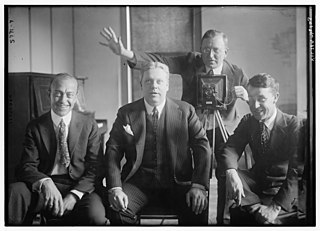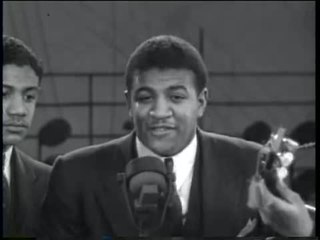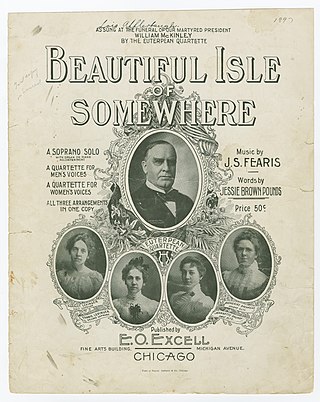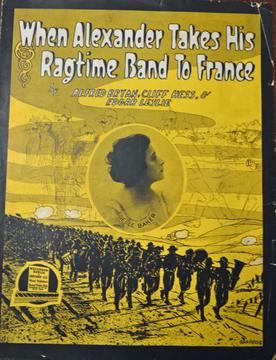"Wanted" is a popular song written by Jack Fulton and Lois Steele. A recording by Perry Como was the most popular version, reaching No. 1 in the US. Al Martino also recorded a version which reached No. 4 in the UK.
"'A' You're Adorable" is a popular song with music by Sid Lippman and lyrics by Buddy Kaye and Fred Wise, published in 1948.

The Peerless Quartet was an American vocal group that recorded in the early years of the twentieth century. They formed to record for Columbia Records, where they were credited as the Columbia Quartet or Columbia Male Quartet. From about 1907, when they began to record for record labels other than Columbia, they were more widely known as the Peerless Quartet.
"If (They Made Me a King)" is a popular song with music written by Tolchard Evans and the lyrics written by Robert Hargreaves and Stanley J. Damerell. The song was written in 1934, but the most popular versions were recorded in 1950–1951. Perry Como's version, recorded November 28, 1950, was a number-one hit on the Billboard charts for eight weeks. The Como version was released under the following labels and catalog numbers:
"Dear Hearts and Gentle People" is a popular song published in 1949 with music by Sammy Fain and lyrics by Bob Hilliard. The song refers to the singer's hometown, and different versions allude to a range of U.S. states.
"Prisoner of Love" is a 1931 popular song, with music by Russ Columbo and Clarence Gaskill and lyrics by Leo Robin.
This is a list of notable events in country music that took place in the year 1942.
"Pennies from Heaven" is a 1936 American popular song with music by Arthur Johnston and lyrics by Johnny Burke. It was introduced by Bing Crosby with Georgie Stoll and his Orchestra in the 1936 film of the same name.
"I Had the Craziest Dream" is a popular song which was published in 1942. The music was written by Harry Warren, the lyrics by Mack Gordon.

"The World Is Waiting for the Sunrise" is a post-World War I popular song, with lyrics by American actor Eugene Lockhart, and music composed by Canadian-born concert pianist Ernest Seitz in 1918. He later claimed he conceived the refrain when he was 12 years-old. Embarrassed about writing popular music, Seitz used the pseudonym "Raymond Roberts" when the song was published on January 24, 1919, by Chappell & Co. Ltd., London, UK.

"Dinah" is a popular song published in 1925 and introduced by Ethel Waters at the Plantation Club on Broadway. It was integrated into the show Kid Boots. The music was written by Harry Akst and the lyrics by Sam M. Lewis and Joe Young. Hit versions in 1926 were by Ethel Waters, The Revelers, Cliff Edwards, and Fletcher Henderson.
"Let's Have Another Cup of Coffee" is a song by Irving Berlin appearing in the musical comedy Face the Music, which opened in 1932. On opening night it was sung by J. Harold Murray and Katherine Carrington. The song, set in a self-service restaurant modeled on the Horn & Hardart Automat, is sung in the play by a group of once-wealthy citizens who were awaiting better times, as mirrored in the song's opening lyrics:

"Down Among the Sheltering Palms" is a popular song.
"It's a Lovely Day Today" is a popular song written by Irving Berlin for his successful musical Call Me Madam (1950) when it was introduced by Russell Nype and Galina Talva. The musical was adapted as a movie in 1953 and the song "It's a Lovely Day Today" was performed by Donald O'Connor and Vera-Ellen.
"Say It Isn't So" is a popular torch song by Irving Berlin, published in 1932. The song was written when Berlin was suffering a loss of confidence following several setbacks, and he initially placed the song in a drawer, feeling that it would not be successful. However, one of Berlin's employees, Max Winslow, heard it, and on his own initiative, took it to Rudy Vallée, who was then a major star on radio. Vallee sang it on his radio show and it became an immediate hit.

Johnnie & Jack were an American country music duo, composed of Johnnie Wright (1914–2011) and Jack Anglin (1916–1963). The duo became members of the Grand Ole Opry in the 1940s. Between 1951 and 1962, the duo released several singles on the RCA Victor Records label, including their version of "Goodnite, Sweetheart, Goodnite" which peaked at No. 4 on the Best Seller charts, and the No. 1 "(Oh Baby Mine) I Get So Lonely".

South Pacific is a compilation album of phonograph records by Bing Crosby, Danny Kaye, Ella Fitzgerald and Evelyn Knight released in 1949 featuring songs from the Rodgers and Hammerstein musical, South Pacific. The album was placed 8th in Billboard's chart of best-selling popular record albums in July 1949.

"Beautiful Isle of Somewhere" is a song with words by Jessie Brown Pounds and music by John Sylvester Fearis, written in 1897. The song gained huge popularity when it was used in William McKinley's funeral. It was subsequently a staple at funerals for decades, and there are dozens of recorded versions.

"When Alexander Takes His Ragtime Band to France" is a World War I era song written by Alfred Bryan, Cliff Hess, and Edgar Leslie in 1918. The song was performed by Marion Harris and released as a single by Victor Records in June 1918.

"That's How Much I Love You" is a country music song written by Arnold, Fowler, and Hall, sung by Eddy Arnold, and released in 1946 on the RCA Victor label. In October 1946, it reached No. 2 on the Billboard folk chart. It was also ranked as the No. 10 record on the Billboard 1946 year-end folk juke box chart.









